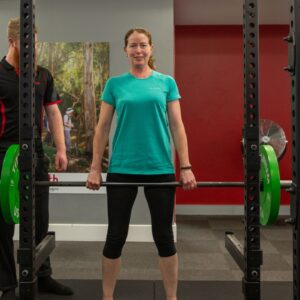With the evolution of the working landscape becoming more sedentary over recent years, the amount of time we spend at our computers, in meetings and travelling to work has significantly risen.
Long sitting periods over an extended amount of time can compromise our musculature and underlying structures:
- Tightening of our hip flexors causes a constant pull on our back due to their attachment to the anterior lumbar spine, pelvis and femur.
- Our glutes provide the greatest amount of stability for our pelvis and lower back; these become weaker and increase the reliance of our hamstrings when we are standing.
- Tension is held in the upper body, shoulders and neck as we hunch over to type.
To prevent joint malalignment, muscle weakness and chronic pain it is important to introduce preventative exercises that counteract the time we spend sitting at our desks. Based on some of your body preferences here are a few examples of exercise we may prescribe for office workers. The exercises can be modified (regressed or progressed) based on each person’s function and ability.
- Pelvic stability: Squats, bridges, romanian deadlifts and resisted hip flexion
- Glute squeezes at your desk to help activate the gluteal neuromuscular
- Core activation: Bird dogs and planks
- Seated or standing cable rows
- Chest press
- Shrugs
- Chin tucks
It is important to also include stretching of your hip flexors, hamstrings, pectorals, lats and deep neck flexors prior to strengthening and regularly throughout your day.
On top of regular preventative exercises, a holistic approach should be taken throughout your working life:
- Taking regular breaks (ideally 10 minutes for every hour sitting)
- Alternate between sitting and stand if possible
- Participate in an active lifestyle
- Maintain a healthy weight
Good luck trying some of these exercises out, be safe and if unsure rather ask, we are also happy to help.
Do you have any questions?
- Call us on (03) 9857 0644 or (07) 3505 1494 (Paddington)
- Email us at admin@mdhealth.com.au
- Check out our other blog posts here
Our clinical staff would be happy to have chat if you have any questions.
Take the first step to a healthier you!
Would you prefer for someone to contact you to book your FREE Full Body Assessment*?
Please fill in this form and someone from MD Health will be in touch with you soon.
Alternatively please call us on:
07 3505 1494 (Paddington – Brisbane (QLD) Clinic)
Or email us:
admin@mdhealth.com.au (VIC) paddington@mdhealth.com.au (QLD)
*Please note only the Full Body Assessment is a FREE service. The Full Body Assessment is for new clients at MD Health or returning clients who haven’t been in for 6 months or longer who intend to particpiate in our 13 Week Clinical Pilates Program**.
For all new clients who wish to come in for a one-off, casual or adhoc basis for Physiotherapy or Exercise Physiology the Initial Physiotherapy or Initial Exercise Physiology appointment is a paid service.
** The 13 Week Clinical Pilates Program at MD Health is not a lock in contract and you are not required to attend for the full 13 weeks if you do not wish.
This site is protected by reCAPTCHA and the Google Privacy Policy and Terms of Service apply.




